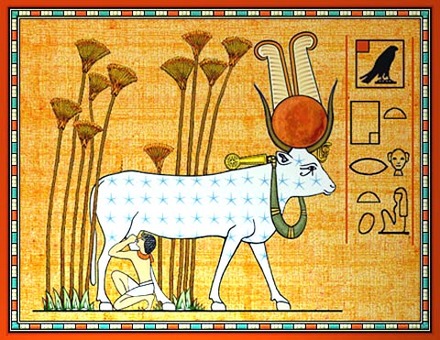The name "Israel" may show that the connections between the Chosen People and Egypt run deeper than we think. And they run very deep anyway.
* When Abram visits Egypt during his early wanderings, Pharaoh borrows Abram's wife, Sarai, having been told she's Abram's sister. (It was common practice for powerful men to kill husbands to make their wives available, hence Abram's ruse.) God strikes Pharaoh's household with pre-Moses plagues, causing Pharaoh to detect the lie and return Sarai in gently used condition after an undisclosed period. While documenting many connections to Egypt, Torah prefers not to make those polytheistic connections too important. So although we might expect the previously childless Sarai to bear Pharaoh's offspring, Scripture prudently postpones her motherhood, via Yahweh's miraculous intervention, to the age of 90, when she gives birth to Isaac, through whom the Hebrew nation will propagate. Meanwhile, Abram's firstborn, Ishmael, arrives from the womb of Sarai's maid, Hagar, who is . . . Egyptian. Exiled due to Sarai's jealousy, Ishmael marries . . . an Egyptian. Abram's grandchildren through Ishmael are therefore three-quarters Egyptian. (Gen. 12 thru 21.)
* The Hebrew nation's bloodline continues through Isaac's son Jacob, founder of the Twelve Tribes of Israel. Ten of those tribes represent the sons of Jacob, while two tribes represent the half-Egyptian sons of Joseph, who has been abandoned into slavery in Egypt by his envious brothers. Having risen to become Pharaoh's right-hand man, Joseph is granted the distinction, unknown among the Chosen People, of being embalmed, making him an honorary Egyptian. (Gen. 50:26.) Jacob, having moved his whole family to Egypt, is also embalmed and publicly mourned there like a local noble. (Gen. 50:2-3.)
* Moses is an Egyptian name, seen in the names of pharaohs such as Thutmose and Ahmose. Torah portrays Moses as the son of Hebrews, people who, during the many Egypt-dwelling generations after Joseph, have sunk into slavery. But the Book also ties him, from infancy, to Egypt, where he's raised by Pharaoh's daughter after being hidden in the rushes of the Nile to escape an Egyptian purge of male Hebrew babies. Moses leads his people out of Egypt, but while he is on the mountain receiving the Ten Commandments, they grow restless and, with the approval of Moses' brother, Aaron, create a leader/god out of gold. The golden calf statue is meant to represent Yahweh, but a major cow god also features in the Egyptian pantheon as Hathor, daughter of the sun god Ra, and in the Canaanite pantheon as El, a.k.a. the Hebrew Elohim. (Ex. 2 & 32.) The Hebrew "Adonai" (Lord) is also a cognate of Aten, the sun god worshiped monotheistically by Pharaoh Akhenaten.
* In the New Testament, the baby Jesus escapes a purge similar to the one Moses avoided, when the Redeemer's family flees . . . to Egypt. (Matt. 2:14.)
The key link between Egypt and Israel is Jacob, because Jacob is given the name Israel after a dream in which he wrestles with a mysterious stranger who can only be an angel of God. The wily Jacob, who progresses through the world by usurping his brother's birthright and foxing his benefactor out of his flocks, has good reason to change his name, which means "cheater." But how do he and his tribe really end up with the appellation Israel?
Imagine you are a Judahite writing a history of the Chosen People during the Babylonian Captivity of the 6th century B.C.E. Since one of your primary purposes, along with compiling traditional stories, is to stamp your nation with an enduring monotheistic identity, you need to make some adjustments. In regional parlance, your people are still inconveniently called Israelites, a name associated with idolatry -- in fact, the tribe and kingdom of Judah separated from the Samaritan kingdom of Israel over that very issue when the northern King Jeroboam set up golden calves to compete with your own Temple in Jerusalem. (1 Kings 12.)
Jacob is an essential patriarch. But his 12 tribes reflect the 12 provinces overseen by the Egyptian sun god Ra. Also, Jacob is associated with Samaria due to his famous wrestling dream at Penuel, which became the capital of the Northern Kingdom of Israel. How to claim him for Judah?
A trick of etymology might get Jacob unidolatrized: The authors of Genesis suggest the angel named Jacob "Israel" because "he struggled" (yishra) with "God" (El). Linguists don't embrace this interpretation, saying it would more likely mean "God struggled," and we know God does not break a sweat. Nevertheless, it stands as tradition. And Torah has done its job, helping to maintain a nation's identity, through every kind of obstacle, for 3,000 years -- a longer run than pharaonic Egypt.
But. What if the primordial meaning of "Israel" were simpler?
Prevailing scholarly opinion holds that the earliest Israelites were a group of oppressed Canaanite fugitives who joined with Egyptian-influenced Yahwists in the Levant hill country.
Consider what such a man might have called himself: "aiysh Ra El" -- "Man of Ra and El."

